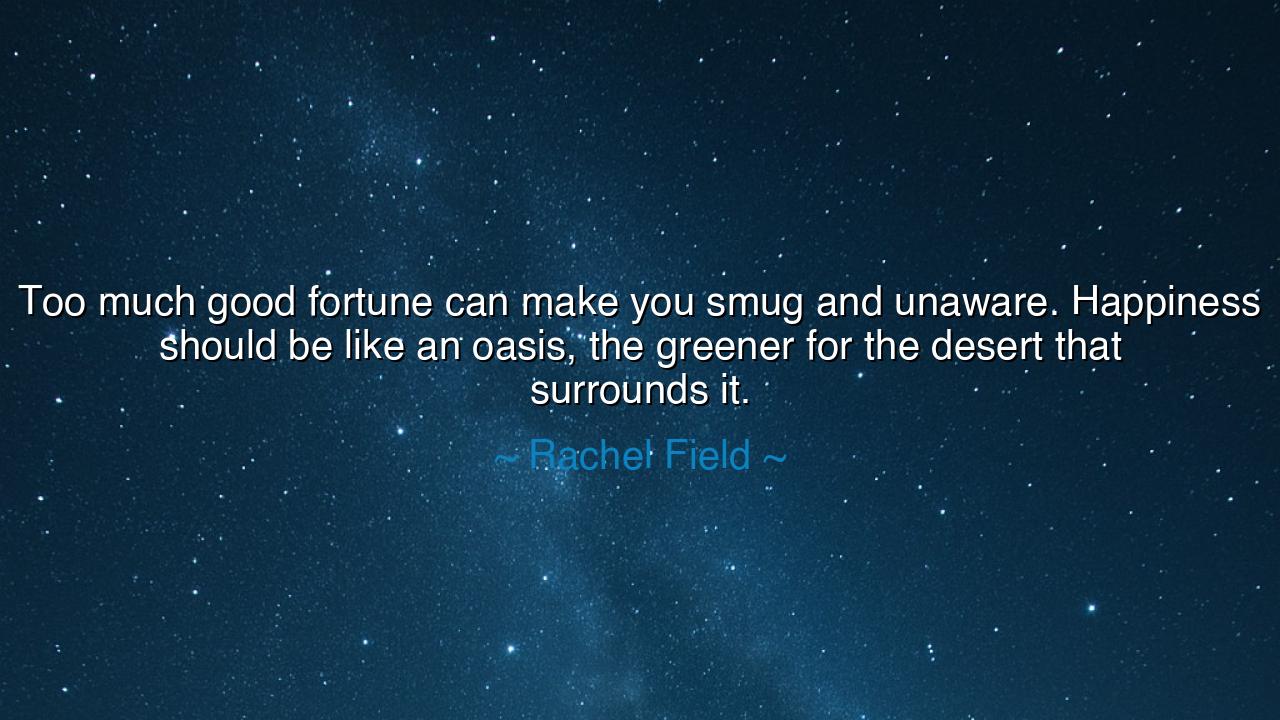
Too much good fortune can make you smug and unaware. Happiness
Too much good fortune can make you smug and unaware. Happiness should be like an oasis, the greener for the desert that surrounds it.






“Too much good fortune can make you smug and unaware. Happiness should be like an oasis, the greener for the desert that surrounds it.” — Rachel Field.
Thus spoke Rachel Field, the poet and storyteller whose words shimmer with the quiet wisdom of those who have looked long upon life’s shifting landscapes. In this reflection, she reveals a truth that the ancients knew well — that happiness is not the constant feast the soul imagines, but a rare and sacred reprieve. It is the oasis in the wilderness of existence, its beauty sharpened by the harshness of the sands that surround it. She warns that too much good fortune — a life of unbroken ease — dulls the senses, breeds arrogance, and blinds the heart. For only through contrast does one learn to see clearly. It is the shadow that makes light visible, the drought that makes water precious.
The origin of this quote lies in Field’s deep sensitivity to both joy and sorrow. As a writer of the early twentieth century, she knew the cycles of hardship and grace that define every human life. Her work often balanced the sweetness of imagination with the weight of reality, and this balance is reflected in her words. To her, happiness was not a possession to be hoarded, but a moment to be cherished — precisely because it is fleeting. She understood that joy untested by suffering becomes hollow, and fortune untempered by loss becomes vanity. The desert, in her metaphor, is not a curse but a teacher; it gives meaning to the oasis.
Throughout history, those who have lived greatly have known this truth. Consider Marcus Aurelius, emperor and philosopher, who ruled the mightiest empire of his age yet spoke humbly of fortune’s fragility. Surrounded by splendor, he warned himself daily that prosperity can harden the heart and cloud the mind. He sought not endless comfort, but balance — the strength to walk through the desert of adversity without losing the oasis of peace within. Or think of Helen Keller, who, though deprived of sight and sound, found a richness of spirit that those blessed with every comfort seldom know. Her happiness was indeed like an oasis — vivid and miraculous against the stark landscape of her challenges.
To live surrounded by ease is to risk forgetting what it means to feel. Smugness, as Field warns, is the blindness of abundance — when one becomes so accustomed to comfort that gratitude fades, and so confident in good fortune that empathy withers. In contrast, hardship awakens the soul. The one who walks through life’s desert learns the value of every drop of kindness, every shade of rest, every moment of laughter. Such a one, upon reaching happiness, drinks deeply — not out of greed, but out of reverence. Thus, joy that follows struggle shines brighter than joy unearned.
Yet Field’s words do not glorify suffering for its own sake. The desert is not a punishment, but a passage — a place where one learns humility, endurance, and faith. It is the trial that refines desire, teaching the heart what truly matters. When happiness comes, as it always does in cycles, it feels like a miracle, not a guarantee. The oasis is greener precisely because one has crossed the sand to find it. To live with this understanding is to live awake — to see beauty in scarcity, gratitude in small joys, and strength in survival.
Consider also the story of Ernest Shackleton, the Antarctic explorer whose ship, Endurance, was trapped and crushed by ice. For two years he and his men drifted in the frozen wilderness, hungry and exhausted. When at last they reached safety, Shackleton wrote not of triumph, but of gratitude — for the bonds of his crew, for the sight of land, for life itself. To him, the simplest warmth was an oasis after the vast desert of the polar night. His happiness, like Field’s vision, was not cheap or easy; it was the kind born of hardship overcome, of humility learned.
So let this wisdom pass from her hand to ours: Do not seek endless comfort, for it will make your heart shallow. Do not curse hardship, for it will deepen your gratitude. When good fortune comes, receive it with wonder, not entitlement. When hardship comes, bear it with grace, for it is shaping the soul that will one day stand in the oasis. The desert and the green are both gifts — one teaches endurance, the other teaches joy.
And remember always the counsel of Rachel Field: “Happiness should be like an oasis, the greener for the desert that surrounds it.” Let your joys be few but profound, your gratitude great, your awareness alive. For the soul that has known thirst will never take water for granted, and the heart that has walked through shadow will cherish the light all the more. Thus, life’s true beauty lies not in perpetual ease, but in the dance between scarcity and grace — where every moment of peace becomes sacred, and every oasis, no matter how small, becomes paradise.






AAdministratorAdministrator
Welcome, honored guests. Please leave a comment, we will respond soon